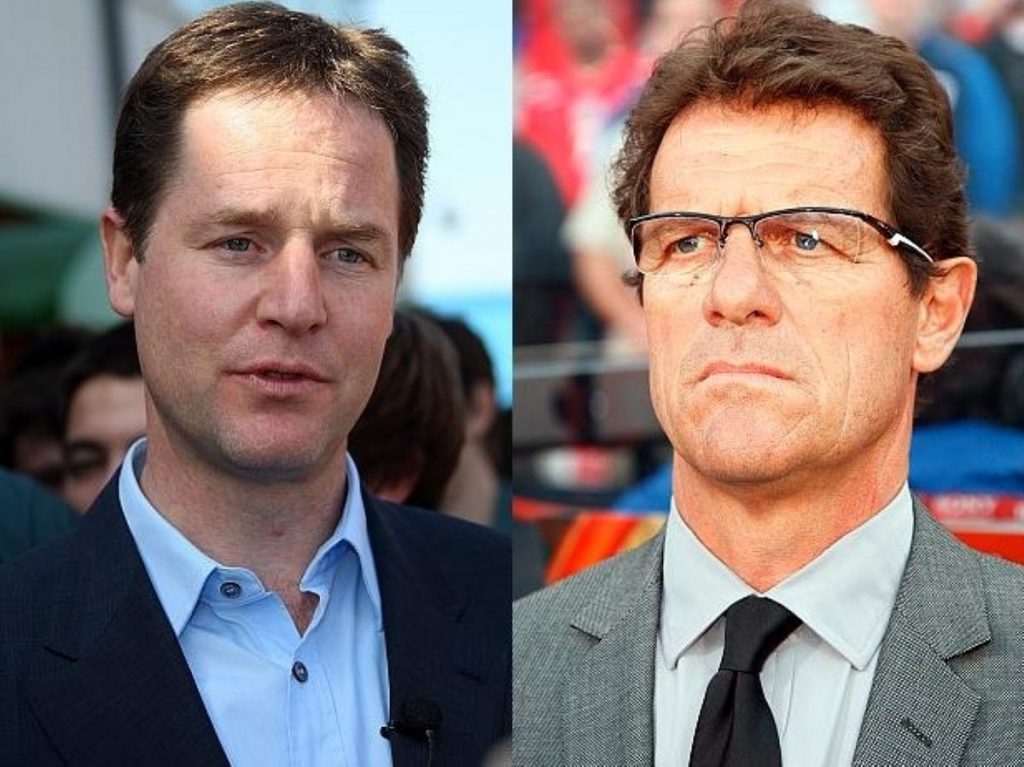Comment: Clegg and Capello – both leading losers?
The Liberal Democrats’ current jitters go much further than their concerns about the emergency Budget. The coalition may be less than two months old, but the cracks are already starting to widen.
Lib Dem supporters should be feeling as miserable as England fans. After all, for Fabio Capello and Nick Clegg’s teams a very promising build-up didn’t quite translate into results when it mattered.
In the critical moments when the time came for action, both managers’ star players didn’t turn up. Wayne Rooney should have been forced to resign. David Laws was.


At least England now get the chance to rebuild and rethink, scratching their heads as they assess a generation of failure.
The Lib Dems are used to generations of failure, but don’t have any such respite. They are in government. England’s players will be subject to days, perhaps weeks, of media anguish. The Lib Dems can look forward to five more years of constant undermining, carping criticism.
It might look as if the emergency Budget is to blame for their concerns. The Commons chamber last Wednesday was a horribly uncomfortable place to be as George Osborne finished delivering his statement. Labour were united in horror as their work was undone in a moment. Tory MPs cheered gleefully, delighted above all to be back in power after 13 years. Only a handful of Lib Dems joined in, their queasy discomfort palpably obvious.
Can they stomach seeing VAT raised to 20%? Will they continue to view Vince Cable as a saint as they watched him desperately citing a thinktank claiming the Budget’s overall package was “slightly progressive”?
It’s a natural human tendency to try and pigeonhole bad thoughts. Lib Dems in the immediate aftermath of the coalition deal tried to look upon the spending cuts as a generic negative which could, they hoped, be undone.
Now, as that far-off prospect becomes a sudden, urgent reality, the case is altered. The botched attempt of Andrew George and fellow conspirators to lay amendments to the finance bill is a dangerous early warning sign that future rebellions can be expected. We’re playing the long game, after all. Will the coalition last five years?
It must do, many torn Lib Dem MPs feel. Their arguments about the benefits of proportional representation will turn to dust if they make a mess of their first stab of coalition government. How will the public be persuaded of a system which generally, rather than unusually, produces hung parliaments if this level of instability becomes the norm?
Yet those same MPs are already straining against the leash. It’s been weeks now, but there has still not been any solid announcement on the way in which the party will maintain an independent voice for portfolios where it does not have a minister in government. It was expected two weeks ago; then, last week; now it is being delayed until the composition of select committees is revealed on Wednesday.
Not having the mechanics sorted is preposterous. It’s like starting off on a long car journey without quite having ensured the wheels are properly screwed on.
Part of the problem is the lack of consultation which went into the formation of the coalition. The heady days in the week after the election in which the party faced huge pressure to make up its mind now seem, to some Lib Dems, to have been rushed and poorly thought-through. How could decisions which will affect the next five years of British politics be so quickly hashed out? Did Danny Alexander and co really consider the implications their to-and-fro bargaining would have for the causes so dear to so many Lib Dems’ hearts? Tuition fees? Nuclear power? Trouble is brewing.
None of this matters if the party feels it is getting a good deal out of being in power. The argument is about the short-term versus the bigger picture, whether it’s worth putting up with the poor being clobbered by VAT in order to end a decades-long wait for political reform. Leaders think on that bigger picture; Clegg’s impassive face during PMQs is a picture of focusing elsewhere. MPs, who spend every day immersed in the throng of politics, have smaller horizons.
Even they would settle for a sea-change in the public’s attitude to the Lib Dems. Having been on the opposition benches for most of the 20th century, regaining their record as a party of government could give them the credibility they have sought for so long.
Early signs suggest that respect hasn’t been forthcoming just yet. Two polls at the weekend put Britain’s third party very firmly in third, slumping to just 16%. That’s seven points worse than their disappointing performance in the election itself and nearly half the party’s top ratings at the peak of their campaign surge.
Clegg has warned that unpopularity can be expected – but the Conservatives’ strong performance around the 40% mark utterly undermines his claim. The Lib Dems are in the doldrums. So where are the positives to being in power now?
The views expressed in politics.co.uk’s comment pages are not necessarily those of the website or its owners.

